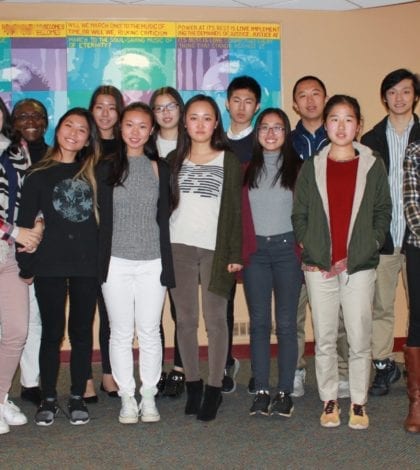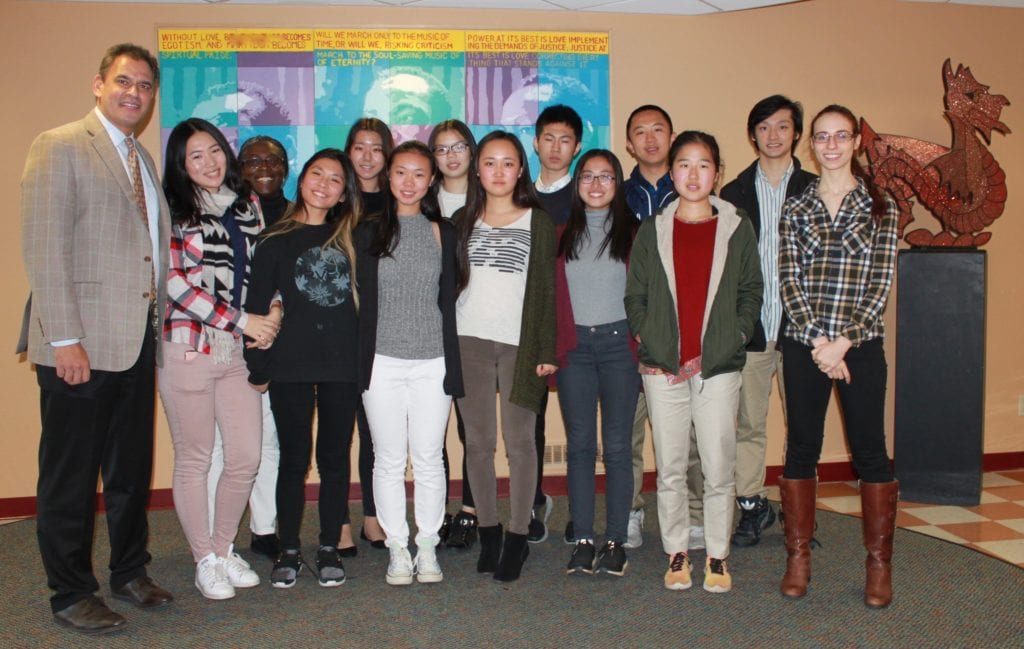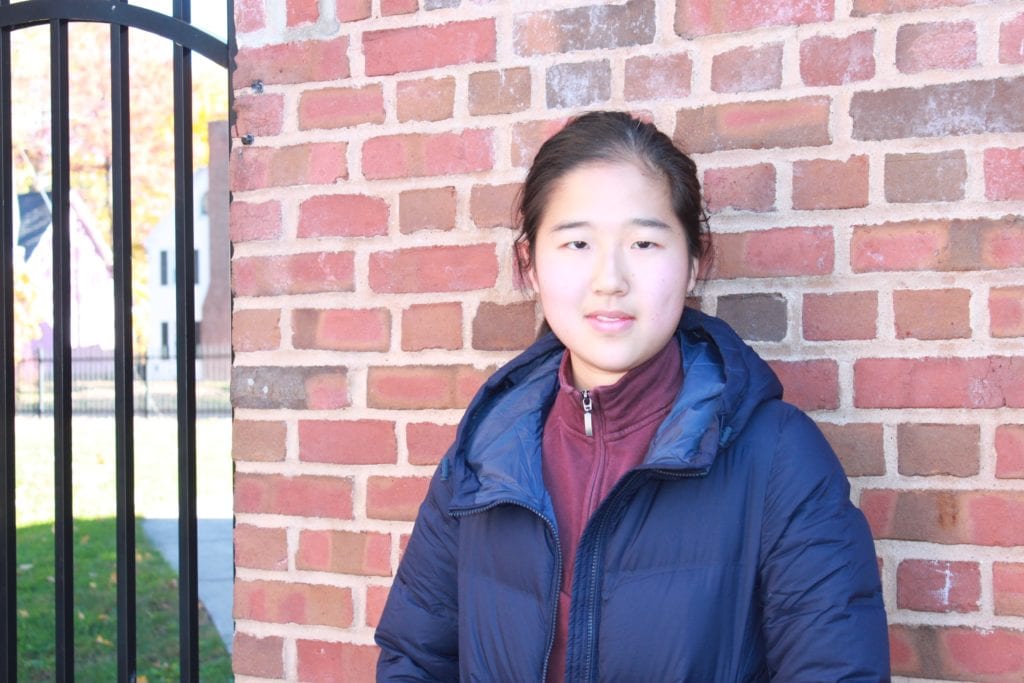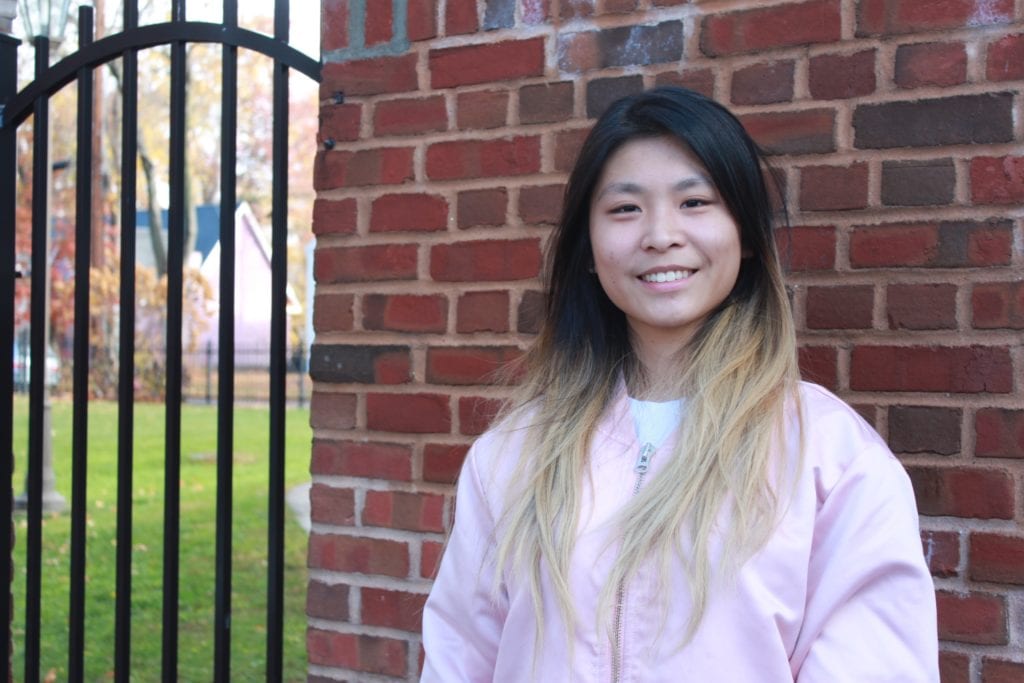International Students Add Dimension to Life at Kingswood Oxford in West Hartford

Audio By Carbonatix

Kingswood Oxford Head of School Dennis Bisgaard with international students. Submitted photo
Kingswood Oxford currently has 11 international students who live with host families in West Hartford and the surrounding area, and several students are profiled below.

Kingswood Oxford Head of School Dennis Bisgaard with international students. Submitted photo
Submitted by Jackie Pisani, Kingswood Oxford School
Casey adores Broadway musicals, especially Phantom of the Opera. Helen runs cross country. Jack’s got excellent puck handling skills. Linda wore grotesque horns on her forehead for Halloween. Just your typical high school kids. Except that they’re Kingswood Oxford’s international students from China.
Beginning in 2014-2015, Kingswood Oxford began a program accepting two students from Asia and currently has enrolled 11 students in the 2016-2017 school year. Working with international agencies like Nacel Open Door, AIEP (Apex International Education Program) and Ivy who place the students with host families in West Hartford, Wethersfield and New Britain, Katie Grossweiner, International Student Coordinator, helps the students select their curriculum for the upcoming year and helps navigate their transition into their new environment. “I’m super impressed by these kids. It blows my mind by what they are able to do and how quickly they adapt.”
Generally, the decision to attend an American high school, explains Grossweiner, is determined by both the parent and the student. “In China there is a huge emphasis on standardized testing, especially the Gaokao which determines college entrance. There’s long hours at school with teachers teaching to the test. Students go home and continue to study for the exam and then attend cram schools on weekends.” Here at KO we have high academic expectations, but there is a balance with sports, clubs and other activities, Grossweiner states.
The biggest advantage for the international students at KO is that they are fully immersed in American culture, especially since they live with an American family. In other American schools, particularly boarding schools, students have a stilted view because of the large population of international students who tend to congregate together. Grossweiner explains, “KO does not have an overwhelming number of international students so their experience is very authentic.” But, there are some difficulties in adapting to the American high school experience. Grossweiner said, “ The kids need to learn sarcasm. That’s hard. Additionally, Chinese students have no foundation of American history so they need to learn a lot of background information that American students have been schooled in from a very young age.”
Over a lunch of dan dan noodles and Sichuan eggplant in garlic sauce from Shu in West Hartford (the most authentic Chinese food locally the international students readily concur) in Joan Edwards’, the Director of Diversity, Inclusion and Cultural Competency, office along with the 11 Chinese students, Head of School Dennis Bisgaard and Grossweiner, the group discusses the students’ transitions and advice they would offer other international students considering a similar path. Besides joining clubs at KO to expand your friend groups, most of the international students concur that reading English novels prior to studying in the States is very beneficial. Although the TOEFL exam administered to international students tests proficiency, novels help the students understand nuances and symbolism.
“Literature requires a deeper level of reading the text,” said one student. Due to the challenges of English class, Jack Gao laughingly asked Bisgaard a practical question, “Do we get extra credit for English class?” “Let the incoming international students know,” Angela joked, “if the English doesn’t kill you, the other language requirement will.”
Edwards told the group that they have a tremendous advantage over their peers as they transition to college, “You understand homesickness.You’ve been through it and have traveled alone. Your multicultural worldview will serve you well since you have learned how to be in another environment.” Bisgaard agreed that the students have had a transformative experience as they have navigated through another culture. “Speaking English as proficiently and naturally the way you do, breaks down assumptions. People think one thing about you and then when you speak, you have altered their perception. That’s powerful, ” said Bisgaard.

Casey Qi. Submitted photo
Casey Qi
Casey first visited the United States in fourth grade when her parents worked here for a year. “That summer we traveled all over the States, visiting the national parks, New York City and Broadway. I love Phantom of the Opera and have seen it 20 times. I also visited Harvard. It changed my life. It was like a dream was born, a beautiful moment.”
Like many international students at KO, Casey was dissatisfied with the Chinese educational system. She described the classes in China as very lecture based with 40 to 50 students in a class. “Here there’s the Harkness table where you sit, you discuss, you ask questions and you explore things together with other students. It’s a better way to learn,” she enthuses. The Chinese system is also more regimented with many requirements she explains.“There’s a lack of freedom. I want to learn more and focus on what I’m interested in. Here at KO there’s the opportunity to do that. I always try to push myself. I like going into a class that I know nothing about.”
Describing herself as intellectually curious, Casey read Gone with the Wind, The Kite Runner, and Eat, Pray, Love prior to coming to the States. Although she read those books for pleasure, she admits she needed to adjust her reading style for writing an English essay. “From my perspective, I see writing as a piece of art. I want to dig deeper. I spent 20 hours and four drafts changes in writing a piece on Salinger’s Nine Stories.”
Casey lives with a family in West Hartford who has a child in college and one employed as a social worker. “I’m pretty adaptable. There’ s not that much strangeness. I’m very grateful. It’s a nice family, and they cook good Mexican food. Casey Skypes with her family every week with family and is in contact with them all the time. “But,” she added, “ I really miss Chinese food.”
Jack Gao
Jack Gao, a sophomore from Beijing, lives with his mother in West Hartford unlike most international students. He describes his mother as a wonderful cook so he invites the other international students to his home to enjoy a home cooked Chinese meal. Jack explained that Chinese schools do not emphasize sports and that the focus is almost exclusively academic. “Most of the school day is focused on academics. The school administrators allow you to run for 40 minutes during the school day so you can relax, but that’s only to prepare you to do another round of schoolwork. Here in the States, I not only play sports but I can join clubs, too.”
One of Jack’s passion is ice hockey, and he explained that the sport is not really played in China. He also plays on the KO JV soccer team. “The sports teams are like families. KO feels like a community. The kids are really friendly.” One struggle Jack faced at KO was writing his first English essay, scoring a disappointing C minus. “Ms. Schieffelin was a huge help in that class. I got an an A on the final so it was really satisfying to see my improvement.The teachers are really helpful.”

Ophelia Deng. Submitted photo
Ophelia Deng
Ophelia, a senior at KO, hails from Amoy, China near Taiwan. As one of the first two international students to enter KO in her sophomore year, she describes the experience as overwhelming. “The first couple of weeks you don’t feel like you are a student. You still feel like a tourist. I kept thinking, ‘I’m not really a part of this; this is not as part of my life. It’s not permanent. Describing herself as directionally challenged, Ophelia admits, “Initially, I always got lost. Especially me. I didn’t know where I go. I have a bad memory and always forgot where I was and where my classes were.”
As one of two sisters, Ophelia said her parents were initially opposed to her studying in the States since her older sister had recently married and left home. Wanting a departure from the Chinese educational system of chronic exams, Ophelia convinced her parent to allow her to study abroad at an American day school since she felt that boarding schools are a “bubble” that do not provide an authentic experience.
Prior to studying in the States, Ophelia readied herself for American culture by watching a steady dose of The Kardashians and Mean Girls. She explains, “What you learn from American movies, it’s not true.” One of the similarities she found with her Chinese peers in China and American students: “We all worry about the same thing. How do we socialize? We all share the universal teen problems.” She enjoys the KO environment of diversity and social equality.
Ophelia lives in New Britain with a family, sharing their routine as an additional family member. Depicting her life back in China as “privileged”, she now does her own laundry, washes dishes and folds her laundry. “Living with another family with another background can shape you. It gives you a different perspective to view the world. That’s the way life should be.”



